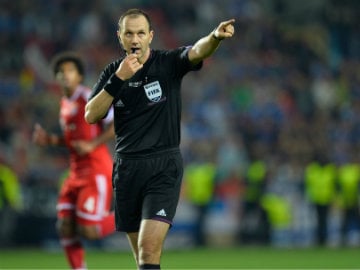
File Photo: Swedish Referee Jonas Eriksson
Sao Paulo, Brazil:
Jonas Eriksson is among the 25 referees who are officiating in the ongoing FIFA World Cup but what sets the Swede apart from his clan is that he happens to be a millionaire who doesn't really need to do this job for a living.
Eriksson, whose experience in refereeing is a vast 20 years, says his drive to be a referee despite having enough money to sustain himself, comes from his love for the game.
He has wealth running up to millions after selling his 15 per cent share in a Swedish media company.
A day after officiating in the Brazil-Cameroon World Cup match in Brasilia, Eriksson said professional referees are able to match up with today's fast-paced game .
"The overall standard of refereeing has improved.
Professional referees have to study, train their minds hard everyday nowadays. Play has become faster and I think the referees are able to match up to the pace of the game.
"You see the players they tend to elbow often these days and the referee has to be on his toes," Eriksson told PTI.
Since Yuichi Nishimura's controversial penalty to Brazil in the 2014 World Cup opener against Croatia, referees have been the centre of attention in the ongoing tournament. The 40-year-old Eriksson, however, defended his colleague.
"The Japanese referee has been one of the best in Asia in recent years. He has been very good in AFC events," said Eriksson.
Nishimura pointed to the spot when Brazil's well-built striker Fred fell to ground from a slight touch on his upper left arm by Dejan Lovren.
However, Eriksson, who is making his World Cup debut, added, "A referee is judged by one error rather than his performance in the whole match. Human error can happen."
He was also in favour of using the goal-line technology.
"I am for goal line technology... you have seen there had been at least two goals which were controversial. It is a good technology."
Eriksson, who previously refereed the United States' 2-1 win over Ghana, is a full-time referee who officiated two matches at the 2012 European Championships and the second leg of the CONMEBOL/AFC play-off between Uruguay and Jordan last November.
Eriksson worked in at least six matches in the UEFA Champions League each of the past three tournaments, including one leg of the semifinal series between Atletico Madrid and Chelsea and a quarterfinal match-up between Bayern Munich and Manchester United.
He also served as the head official for four different European qualifying matches in the lead-up to the World Cup, handing out a total of 18 yellow cards, one red card and one penalty kick. He was promoted to the elite category of UEFA referees in 2009-10 season.
He also officiated three matches in the Under-20 World Cup in 2013, as well as the 2013 UEFA Super Cup final, which saw Bayern Munich beat Chelsea.
Eriksson, whose experience in refereeing is a vast 20 years, says his drive to be a referee despite having enough money to sustain himself, comes from his love for the game.
He has wealth running up to millions after selling his 15 per cent share in a Swedish media company.
A day after officiating in the Brazil-Cameroon World Cup match in Brasilia, Eriksson said professional referees are able to match up with today's fast-paced game .
"The overall standard of refereeing has improved.
Professional referees have to study, train their minds hard everyday nowadays. Play has become faster and I think the referees are able to match up to the pace of the game.
"You see the players they tend to elbow often these days and the referee has to be on his toes," Eriksson told PTI.
Since Yuichi Nishimura's controversial penalty to Brazil in the 2014 World Cup opener against Croatia, referees have been the centre of attention in the ongoing tournament. The 40-year-old Eriksson, however, defended his colleague.
"The Japanese referee has been one of the best in Asia in recent years. He has been very good in AFC events," said Eriksson.
Nishimura pointed to the spot when Brazil's well-built striker Fred fell to ground from a slight touch on his upper left arm by Dejan Lovren.
However, Eriksson, who is making his World Cup debut, added, "A referee is judged by one error rather than his performance in the whole match. Human error can happen."
He was also in favour of using the goal-line technology.
"I am for goal line technology... you have seen there had been at least two goals which were controversial. It is a good technology."
Eriksson, who previously refereed the United States' 2-1 win over Ghana, is a full-time referee who officiated two matches at the 2012 European Championships and the second leg of the CONMEBOL/AFC play-off between Uruguay and Jordan last November.
Eriksson worked in at least six matches in the UEFA Champions League each of the past three tournaments, including one leg of the semifinal series between Atletico Madrid and Chelsea and a quarterfinal match-up between Bayern Munich and Manchester United.
He also served as the head official for four different European qualifying matches in the lead-up to the World Cup, handing out a total of 18 yellow cards, one red card and one penalty kick. He was promoted to the elite category of UEFA referees in 2009-10 season.
He also officiated three matches in the Under-20 World Cup in 2013, as well as the 2013 UEFA Super Cup final, which saw Bayern Munich beat Chelsea.
Track Latest News Live on NDTV.com and get news updates from India and around the world

